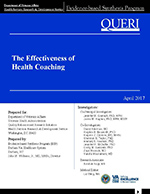
Co-Principal Investigators:
Jennifer M. Gierisch, PhD, MPH;
Jaime M. Hughes, PhD, MPH, MSW
Co-Investigators:
David Edelman, MD;
Hayden B. Bosworth, PhD;
Eugene Z. Oddone, MD, MHSc;
Shannon S. Taylor, PhD;
Andrzej S. Kosinski, PhD;
Jennifer R. McDuffie, PhD;
Cindy M. Swinkels, PhD;
Zayd Razouki, MD;
Varsha Masilamani, MD
Research Associate:
Avishek Nagi, MS
Medical Editor:
Liz Wing, MA
Download PDF: Complete Report, Abstract, Report, Appendices
Improving the management of multiple chronic conditions continues to be a top priority for VA researchers and clinicians alike. This evidence report was commissioned to examine the effectiveness of health coaching on changes in clinical health outcomes, health behaviors, and other key outcomes of interest to stakeholders. The report is intended to inform clinical practice decisions and develop guidelines on how best to incorporate the use of health coaching within the VA healthcare system. It is also intended to identify key program elements associated with variable intervention effects, including the patient groups most likely to benefit, the optimal dose (ie, the number and frequency of coaching sessions), the mode of coaching delivery, and the most effective types of people/professionals to conduct health coaching (eg, physicians, social workers, nurses, dieticians, peers). This report identifies gaps in evidence that warrant further research, which may help the Office of Patient Centered Care and Cultural Transformation (OPCC&CT) and the National Center for Health Promotion and Disease Prevention (NCP) prioritize future research projects.
KQ 1: Among adults, what is the effectiveness of health coaching on
KQ 2: Among adults, does the impact of health coaching vary by
Systematic Review: The Effectiveness of Health Coaching (Management Brief)